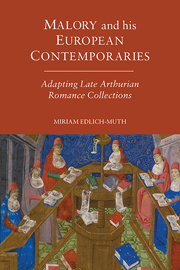Book contents
- Frontmatter
- Dedication
- Contents
- Colophon
- Acknowledgements
- Introduction
- 1 The Adaptation Process
- 2 Style and Narrative Strategy
- 3 Chronological and Genealogical Structures in the Morte Darthur, the Buch der Abenteuer and the Tavola Ritonda
- 4 Narrative Plot Development in the Morte Darthur, the Buch der Abenteuer and the Tavola Ritonda
- 5 ‘The Best Knight in the World’: Adapting Character Constellations
- Conclusion
- Appendix: Note on the Texts and Manuscripts
- Bibliography
- Index
- Arthurian Studies
Introduction
Published online by Cambridge University Press: 05 March 2014
- Frontmatter
- Dedication
- Contents
- Colophon
- Acknowledgements
- Introduction
- 1 The Adaptation Process
- 2 Style and Narrative Strategy
- 3 Chronological and Genealogical Structures in the Morte Darthur, the Buch der Abenteuer and the Tavola Ritonda
- 4 Narrative Plot Development in the Morte Darthur, the Buch der Abenteuer and the Tavola Ritonda
- 5 ‘The Best Knight in the World’: Adapting Character Constellations
- Conclusion
- Appendix: Note on the Texts and Manuscripts
- Bibliography
- Index
- Arthurian Studies
Summary
‘Arthur is not a closet homosexual, Guinevere is not a proto-feminist and the Sword in the Stone is not a metaphor for anything.’
These are the words with which David Robson praises the ‘bluntness’ and ‘humility’ of Peter Ackroyd's 2010 adaptation of Malory's Morte Darthur. Highlighting the fact that he has made ‘no effort to give the narrative a postmodern twist’, Robson admires how Ackroyd ‘has simply condensed Malory's book, stripping out the rambling and repetitive elements that would have little appeal to a modern readership’, and turning Malory's prose into a ‘contemporary idiom’.
Ackroyd's adaptation of a single prose source in English into a new English prose work may seem tame when compared with the more ambitious adaptations being produced in fourteenth- and fifteenth-century Europe, in which prose and verse sources from different languages were fashioned into vast narrative chronologies of King Arthur and his court. Nonetheless, Ackroyd's work is a part of that tradition of adaptation, condensation and modernisation and it is on account of works such as his that medieval Arthurian romance collections still seem strikingly familiar to contemporary readers. While the exact elements of the plot vary, the central characters, the images and the main events of the Arthurian story have remained recognisable over the centuries. As a result, Wace's Roman de Brut, a twelfth-century Norman verse adaptation of Geoffrey of Monmouth's Historia Regum Britanniae, can still be seen shaping Ackroyd's work.
- Type
- Chapter
- Information
- Malory and his European ContemporariesAdapting Late Arthurian Romance, pp. 1 - 10Publisher: Boydell & BrewerPrint publication year: 2014



